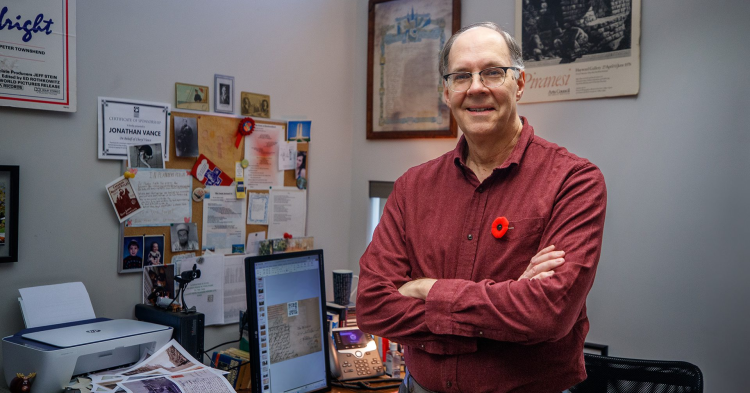In communities and classrooms around the country, Western history professor Jonathan Vance's First World War postcard project is teaching a new generation about the everyday people who fought in one of the world's deadliest wars.
Vance completed the first round of the project last year, sending more than 400 replicas of postcards sent by Canadian soldiers during the First World War to the original Canadian addresses that received them.
But many smaller communities did not have modern addresses that matched the postcards' original destinations. During that era, many small towns did not have street names with numbered addresses as they do today.
Vance came up with the idea to create educational packets to send to schools in these areas.
"The idea is to help teachers foster an understanding in their students of the connections between the First World War and our modern times," said Vance.
More than 10,000 replica postcards have been circulated to roughly 200 schools in 125 communities across Canada this fall, Vance said.
The replicas are based on original postcards, archived as part of the Ley and Lois Smith War, Memory and Popular Culture Research Collection, and accessible to the public through the Wartime Canada website.
Now students across Canada can hold these messages in their hand, making First World War history come alive for the next generation.

Western history professor Jonathan Vance hopes the postcards will remind students of their community connections to those who served in the First World War. (Steve Anderson/Western Communications)
From archives to classrooms
Along with the postcards, teachers were sent lesson plans both about the postcards and local war memorials in their areas. Some schools also received pictures of their communities from the 1910s to help students think about the connections to the present day.
For Vance's team, this personalized approach was a massive undertaking, but worth the effort.
"The response has been incredible. The teachers were shocked and delighted to see the packets focused on their communities."
Waterdown District High School in Waterdown, Ont. was one of the schools that received a postcard package with the educational materials. The school, just outside Hamilton, also happens to be Vance's alma mater.
History teacher Nathan Tidridge was thrilled to receive a packet to use with his Grade 9 and 10 classes.
"I knew it would be something that's locally based, and we're big on that here. When I found out there would be postcards written by people that inhabited the same space as the kids, I knew they would be excited."
Using the postcards as a teaching tool, Tidridge asked his students to use the national Canadian military database to investigate the records of the soldiers who wrote the cards - a process he said generated positive responses from students and parents.
"In an age where we're so connected yet disconnected, assignments like this really pull kids in," said Tidridge.
Bringing world history home
Ryan McCracken is a Grade 12 student completing a co-op placement in Tidridge's class. He's helped Tidridge with the postcard assignments. What he found most striking was the difference in writing style, but also the familiar content of the messages.
"I think in the last 100 years a lot has changed, and a lot hasn't changed," said McCracken.
According to Vance, many soldiers during that era would have been at a Grade 6 literacy level or even lower. Coupled with a different style of writing, some students had difficulty understanding the messages.
"The hardest thing to grasp for me, and the Grade 10 students, was the cursive writing," said McCracken.
However, once they overcame the initial challenges, McCracken said he found the soldiers from this by-gone era were not so dissimilar from youth today. He said he was surprised at how mundane the messages were and likened them to a text or tweet today.
"At the core of these very simple messages there's a sort of basic humanity." - Ryan McCracken, Grade 12 student at Waterdown District High School
"You'd think there'd be more going on in them, but all these people wanted was to have any sort of communication with the people they care about," McCracken added.
Tidridge emphasized how important it is for today's youth to see that soldiers and their families kept living their lives, despite immense hardship.
"The technology has changed, but humanity hasn't," he said. "We need more of this for our students, because I think there's a perception that they aren't interested in history. But when you engage them in local history and those personal relationships, kids are really interested in that."













